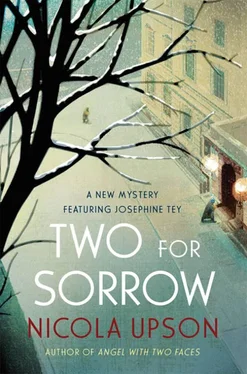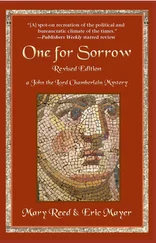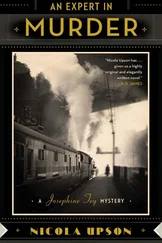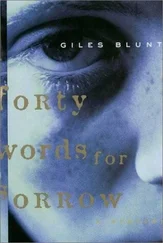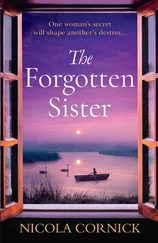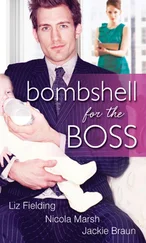She was absolutely right, of course: there was no evidence as yet to place her in St Martin’s Lane on Friday night, or to prove that Lucy’s fall had been anything other than an accident. A meticulous search of her living accommodation had revealed nothing of any significance, but Penrose never expected it to: one look around her office had told him that she was not the sort of woman who left her life lying around for others to read. He had one more gamble up his sleeve, though, and he chose his next words cautiously, careful to avoid a lie: ‘That may have been true last night, Miss Bannerman, but I’m pleased to say that things are very different this morning. Perhaps you’ve forgotten Lucy Peters? She’s only a servant, I know, and probably not very important in the scheme of things as you see it, but she was close to Marjorie Baker and the two of them shared some very interesting information.’
She laughed, but he was encouraged by the first flicker of doubt in her eyes. ‘You’re bluffing, of course. People with mouths as badly scalded as Lucy’s are incapable of talking, no matter how interesting the information they have.’
‘Indeed. But they can write things down.’ He let the suggestion sink in, then pushed the two letters across the table towards her. ‘These notes, one written by Miss Baker and found in your desk, and one by WPC Wyles, refer to a secret in your past which you would prefer to forget. Would you care to tell me what that is, Miss Bannerman?’
She stared at him for a long time. ‘You’re talking to a dead woman, Inspector,’ she said eventually.
Her voice was soft, but the calm acceptance of something too horrific for most people to contemplate unnerved him. ‘I’m glad you can look at your fate so stoically,’ he said, ‘particularly as you have such an intimate understanding of what the process of justice involves.’
Bannerman smiled, and settled back in her chair. ‘That wasn’t quite what I meant, but do go on. Why don’t you tell me what you think you know about my life?’
Refusing to let her condescension frustrate him this time, Penrose said: ‘With pleasure. Let’s start thirty years ago, when you left Holloway and moved on to your new job in Leeds. By that time, you were involved with a former prisoner called Eleanor Vale. Vale had attacked you in Holloway, but you were young and dedicated to your work, and you genuinely believed that you could rehabilitate her and turn her life around. You meant well, but your efforts were misguided,’ he continued, satisfied to see that his condescension was beginning to irritate her . ‘Not content with forgiveness, you took her into your home, and by the time you realised your mistake, Vale had become so dependent on you that it was impossible to free yourself of her. The only way out, as far as you could see, was to leave her behind once and for all, so you accepted a position in Yorkshire and made sure that she was unable to follow you. Eleanor Vale made the ultimate sacrifice for your career. She died for it.’
When he had finished, she began to applaud. ‘You tell a good story, Inspector, and a far more accurate one than your friend. Accurate, except for one important detail: Eleanor Vale isn’t dead.’
Her words threw Penrose for a moment: if Vale was still alive, the whole foundation of his case was destroyed. Why would Bannerman start to kill so suddenly if not to hide a past crime? As he struggled to make sense of what she was saying, she stared at him impatiently, incensed by his confusion. ‘Someone like Celia Bannerman could never have killed Eleanor Vale. Do you understand that?’ She slammed her hand hard down on the table, making him flinch. The force of the blow must have damaged skin which was already burnt and sore from Saturday, and he saw a trickle of blood seep out from beneath the bandage, but she seemed oblivious to the pain. ‘Do you understand that, Inspector, or do I have to spell it out for you? Celia Bannerman did not kill Eleanor Vale. Eleanor Vale killed Celia Bannerman. She pushed her under a tube train, to be precise, and walked away with her life.’
Penrose heard Fallowfield draw his breath in sharply, and suddenly he understood exactly why he had found it so difficult to reconcile the compassionate prison warder whom Ethel Stuke had described with the woman he was convinced was a killer. ‘You’re Eleanor Vale, aren’t you?’ he said, shaking his head in disbelief, ‘and you’ve lived as Celia Bannerman for thirty years. How the hell have you managed it? She was a respected prison officer and a qualified nurse with a great future ahead of her.’
‘And Eleanor Vale was just a convict? A baby farmer with no right to any other identity, branded with one mistake for life? I was a qualified nurse, too, Inspector. I had a future, and those thirty years were only the life that I would have had if circumstances had been different.’
‘You mean if you hadn’t served two years’ hard labour for leaving babies to die in railway carriages.’
‘Don’t even begin to talk about things you don’t understand. I did what was necessary to survive. All my life, I’ve done that. Nothing more, and certainly nothing less.’
‘And why was it so necessary to kill the woman who tried to help you?’
‘Help me? She picked me up and dropped me. How do you think it feels to be taken on as a project until something better comes along? To spend your life being grateful, only to find out that it’s all been for nothing? Yes, I was dependent on her, as you put it, but only because she made me that way. And if I was that disposable to her, why should she be any different to me?’
‘So you planned to kill her.’
‘No, not at all. It had never occurred to me that I was capable of killing anybody. I begged her to change her mind and either stay or take me with her, but she said it was impossible. On the morning she was due to leave, I watched her pack her whole life into two suitcases and stow away all her private papers and precious letters of reference, and I walked her to the underground station. It was the middle of August, and so hot in those tunnels. The platform was busier than usual because London was full of summer visitors, and I remember feeling more and more desperate as we waited. Even then, I don’t think I’d have done anything about it, but when we heard the train coming and she turned to kiss me goodbye, she looked at me and she said: “However will you manage without me?” ’ She rubbed a hand across her eyes, and Penrose could see that she was making an effort to suppress a thirty-year-old rage. ‘I’m afraid that was more than I could tolerate, Inspector—not just the smug, self-righteous arrogance of it all, but her complete inability to understand what she’d done. I must have pushed her, because the next thing I knew, she was under the train and people were screaming, but I have absolutely no recollection of that moment. I was eaten up with anger and resentment, and I just wanted to be rid of her. Please don’t misunderstand me—I’m not trying to make excuses, and I’m not sorry for what I did. She played with my life, then taunted me with my own weakness, and I killed her for it. But if she’s looking down now, she’ll see exactly how I’ve managed without her.’
Penrose stared doubtfully at her; in his heart, he believed what she was saying to be true, but it was an enormous risk to take, and he said so.
‘What did I have to lose? I picked up those cases automatically and walked away, half expecting someone to come after me, but it was too crowded for anyone to have noticed what happened. I suppose I was in shock, because I walked around for ages before it occurred to me that I had a chance, that I was holding the possibility of another life in my hands. I went back to that house one last time to pack up Eleanor Vale’s things, and I sent them to a charity—Celia would have approved of that, and most of the clothes were her cast-offs anyway. Then I went north.’
Читать дальше
